Lithuania in the Eurovision Song Contest
Lithuania has participated in the Eurovision Song Contest (known in Lithuania as Eurovizijos dainų konkursas) 20 times since its debut in 1994, where Ovidijus Vyšniauskas finished last, receiving "nul points". Lithuania withdrew from the contest, not returning until 1999. LT United's sixth place in 2006 with the song "We Are the Winners" is Lithuania's best result in the contest. The country reached the top ten for a second time in 2016, when Donny Montell finished ninth with "I've Been Waiting for This Night".
| Lithuania | |
|---|---|

| |
| Member station | Lithuanian National Radio and Television (LRT) |
| National selection events | Internal selection
National final
|
| Participation summary | |
| Appearances | 20 (13 finals) |
| First appearance | 1994 |
| Best result | 6th: 2006 |
| Nul points | 1994 |
| External links | |
| Lithuania's page at Eurovision.tv | |
Lithuania in the Eurovision Song Contest 2021 | |
History
2000s
Having been relegated from the 2000 contest the country returned in 2001 with Skamp and "You Got Style", the first Lithuanian song to include English. They received 35 points, placing 13th. However the following year, Aivaras could only manage to come second last with 12 points.
Since the semi-finals were introduced Lithuania again came last with Laura and the Lovers and "Little by Little". The following year the Lithuanian broadcaster Lietuvos Nacionalinis Radijas ir Televizija (LRT) sent LT United to the 2006 contest with the football chant-like song "We Are the Winners". They took Lithuania to the final for the first time since 2002, coming sixth in the final with 162 points, Lithuania's best placing as of 2019.
The following year Lithuania automatically qualified for the final, however 4Fun could not replicate LT United's success, coming 21st with only 28 points, 12 of which came from Ireland. In 2008 Jeronimas Milius failed to reach the final, coming 16th of 19 competing nations in the second semi-final.
Lithuania threatened to boycott the 2009 contest "if Russia continues to showcase power and ignores international law". The statement was made in reaction to the Russia's actions in the 2008 South Ossetia war.[1] Culture Minister Jonas Jucas stated that it was too early to discuss the boycott since "spontaneous decisions might aggravate the efforts of diplomats" and thus make the situation worse. At the Eurovision Song Contest 2009, Lithuania qualified from the semi finals and at the end of the voting in the final had received 23 points, placing them 23rd.[2]
2010s
LRT announced in December 2009 that, due to a lack of necessary funds, Lithuania would formally withdraw from the 2010 Contest. However, in the event that the necessary funds of 300,000 litas (€90,000) would be found the broadcaster announced that they would attempt to continue the country's participation.[3] Ultimately, private company TEO LT provided the necessary funding and Lithuania participated in Bærum.
In 2011, Lithuania participated in the first semi-final on the 10 May 2011 and after coming fifth, qualified for the Final. In the final, Lithuania received 63 points, to finish 19th.
In 2012, Lithuania qualified for the final placing 3rd with 104 points Donny Montell finished 14th in the Grand Final with the song "Love Is Blind".
In 2013, Lithuania quafiled to the final,he placed 9th in the first semi-final, with 53 points, qualifying Lithuania to the finals for the 3rd time in row.In the final,he ended on 22nd place with 17 points.
In 2014, Vilija didn't qualify to final finishing 11th of 15 entrants in the second semi-final, scoring 36 points.
In 2016, Donny Montell returned to the contest in 2016 and achieved Lithuania's best result of the decade so far, finishing ninth with the song "I've Been Waiting for This Night". In 2018, Ieva Zasimauskaitė achieved Lithuania's fifth top 15 result, finishing 12th with "When We're Old".
As of 2019, Lithuania remains the only Baltic country not to win the contest after wins for Estonia in 2001 and Latvia in 2002. However, since the introduction of the semifinal round in 2004, Lithuania has more final appearances than the other Baltic nations, with nine, compared to seven for Estonia and six for Latvia.
Contestants
3 |
Third place |
◁ |
Last place |
X |
Entry selected but did not compete |
Awards
Winner by OGAE members
| Year | Song | Performer | Final | Points | Host city | Ref. |
|---|---|---|---|---|---|---|
| 2020 | "On Fire" | The Roop | Contest cancelled | |||
Barbara Dex Award
| Year | Performer | Host city | Ref. |
|---|---|---|---|
| 2014 | Vilija Matačiūnaitė |
Related involvement
Commentators and spokespersons
| Year | Commentator | Spokesperson | Ref. |
|---|---|---|---|
| 1994 | Darius Užkuraitis | Gitana Lapinskaitė | |
| 1995-1998 | No broadcast | Did not participate | |
| 1999 | Darius Užkuraitis | Andrius Tapinas | |
| 2000 | Did not participate | ||
| 2001 | Loreta Tarozaitė | ||
| 2002 | |||
| 2003 | Did not participate | ||
| 2004 | Rolandas Vilkončius | ||
| 2005 | |||
| 2006 | Lavija Šurnaitė | ||
| 2007 | |||
| 2008 | Rolandas Vilkončius | ||
| 2009 | Ignas Krupavičius | ||
| 2010 | Giedrius Masalskis | ||
| 2011 | |||
| 2012 | Ignas Krupavičius | ||
| 2013 | |||
| 2014 | |||
| 2015 | Ugnė Galadauskaitė | ||
| 2016 | |||
| 2017 | Darius Užkuraitis and Gerūta Griniūtė | Eglė Daugėlaitė | |
| 2018 | |||
| 2019 | Giedrius Masalskis |
Photogallery
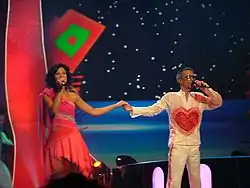 Linas and Simona in Istanbul (2004)
Linas and Simona in Istanbul (2004)
 Jeronimas Milius in Belgrade (2008)
Jeronimas Milius in Belgrade (2008)
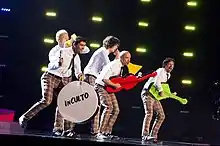
 Andrius Pojavis in Malmö (2013)
Andrius Pojavis in Malmö (2013)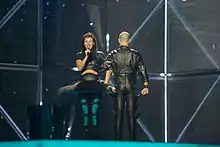

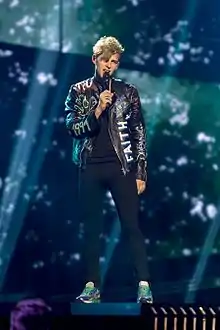 Donny Montell in Stockholm (2016)
Donny Montell in Stockholm (2016)
.jpg.webp) Ieva Zasimauskaitė in Lisbon (2018)
Ieva Zasimauskaitė in Lisbon (2018)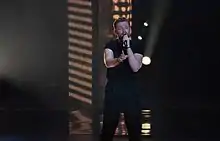 Jurij Veklenko in Tel Aviv (2019)
Jurij Veklenko in Tel Aviv (2019)
Notes
- Includes two phrases in French.
- According to the then-Eurovision rules, the top ten non-Big Four countries from the previous year along with the Big Four automatically qualified for the Grand Final without having to compete in semi-finals. For example, if Germany and France placed inside the top ten, the 11th and 12th spots were advanced to next year's Grand Final along with all countries ranked in the top ten.
- Also contains phrases in French, and American Sign Language was also used in the live performance.
- Contains two lines in Lithuanian.
- The 2020 contest was cancelled due to the COVID-19 pandemic.
References
- "Lithuanian Broadcaster Head supports his Estonian colleague in Eurovision boycott". ESCKaz. 2008-08-22. Archived from the original on 2012-03-20. Retrieved 2008-08-22.
- Vaida, Petras (2008-08-25). "Culture minister of Lithuania: too early to speak about boycott of Eurovision". The Baltic Course. Archived from the original on 2009-05-22. Retrieved 2008-08-25.
- Hondal, Victor (2009-12-15). "Lithuania seeking funding for Eurovision 2010". ESCToday. Archived from the original on 17 December 2009. Retrieved 15 December 2009.
- "Lithuania wins OGAE Fan Contest!". esc-plus.com. 16 May 2020. Retrieved 19 May 2020.
- Adams, William Lee (9 July 2015). "Poll: Who was the worst dressed Barbara Dex Award winner?". Wiwibloggs. Retrieved 8 December 2019.
- "D. Užkuraitis "Euroviziją" šiemet komentuos ne vienas - LRT". Lietuvos Radijas ir Televizija. 5 May 2017. Archived from the original on 5 August 2017. Retrieved 3 May 2018.
- "Eurovizinius Lietuvos balus šiemet skelbs E. Daugėlaitė". lrt.lt. 2 May 2017. Retrieved 2 May 2017.
External links
- Points to and from Lithuania eurovisioncovers.co.uk